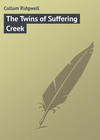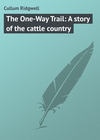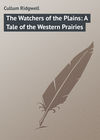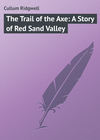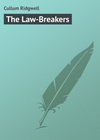Loe raamatut: «The Twins of Suffering Creek», lehekülg 18
CHAPTER XXVI
WILD BILL INSPECTS HIS CLAIM
Suffering Creek awoke on the Monday morning laboring under a hideous depression of nightmare. There was no buoyancy in the contemplation of the day’s “prospect.” It was as though that wholesome joy of life which belongs to the “outdoor” man had suddenly been snatched away, and only the contemplation of a dull round of unprofitable labor had been left for the burdened mind to dwell upon.
It was in this spirit that Joe Brand rubbed his eyes and pulled on his moleskin trousers. It was in this spirit that the miner, White, slouching along to the store for breakfast, saw and greeted him.
“Nuthin’ doin’ in the night,” he said, in something like the tone of a disappointed pessimist.
“No.” Joe Brand did not feel a great deal like talking. Besides the nightmare depression that held him he had drunk a good deal of rye whisky overnight.
White stared out across the creek, whither his thoughts were still wandering.
“Maybe we–was scairt some,” he observed, with a hollow laugh.
“Maybe.”
Joe’s manner was discouraging.
“Gettin’ breakfast?” the other inquired presently.
“Guess so.”
And the rest of the journey to the store was made in morose silence.
Others were already astir when they reached their destination. And at some distance they beheld a small group of men clustering at one point on the veranda. But such was their mood that the matter had no interest whatever for them until they came within hailing distance. Then it was that they were both startled into new life. Then it was that all depression was swept away and active interest leapt. Then it was that sore heads and troubled thoughts gave way before an excitement almost equal to the previous day’s, only that it carried with it a hope which the latter had almost killed.
“Say, don’t it beat hell?” demanded a burly prospector as they came up, pointing back at the wall of the store where the group was clustering like a swarm of bees.
“Don’t what?” inquired Brand, with only partial interest.
“Why, that,” cried the man, still pointing. “Ther’ it is, all writ up ther’. It’s in Minky’s writin’, too. They’re sendin’ out a stage, Wednesday. Git a peek at it.”
But Brand and his companion did not wait for his final suggestion. They, too, had already joined the cluster, and stood craning on the outskirts of it. Yes, there it was, well chalked out in Minky’s bold capitals–an invitation to all his customers to trade all the gold they chose to part with to him at the usual rates, or to ship direct to the bank at Spawn City by a stage that was to leave Suffering Creek at eight o’clock on Wednesday morning, its safe delivery insured, at special rates, by the storekeeper himself.
It was the most astounding notice, under the circumstances, ever seen on Suffering Creek, and as the citizens read it excitement surged to a tremendous pitch.
The man called Van expressed something of the thought in every mind as he turned to Brand, who happened to be at his side.
“Gee!” he cried, with ironical levity. “Old Minky’s plum ‘bug.’ He’s waited to ‘unload’ till James’ gang has got the camp held up three miles out. Wal, I ain’t shippin’. Guess I’ll trade my dust at a discount. It’s a sight easier carryin’ United States currency.”
“But he’s guaranteein’ delivery at the bank,” protested Brand.
“That’s what it sez, sure,” observed White doubtfully.
“It beats me,” said the burly miner perplexedly, again drawn to the notice by the apparent recklessness of its purport. “It beats me sure,” he reiterated. Then, after a thoughtful pause, he went back to his original statement as something that expressed the limit of his understanding. “It sure do beat hell.”
So it was throughout the morning. And by noon every soul in the camp had seen or heard of Minky’s contemplated recklessness. The place was wild with excitement, and, instead of setting out for their various claims for the usual day’s work, every man went out to scrape together any “dust” he possessed, and brought it in to trade.
And Minky bought with perfect good-humor, discounting at the recognized tariff, but always with solemn eyes, and a mind still wondering at his overnight interview with Wild Bill. He had obeyed him implicitly, knowing that he was making a liberal profit for himself, whatever the gambler might be risking. All his transactions were guaranteed for him by the small fortune which Bill possessed safely deposited in the Spawn City bank. Well, it was not for him to hesitate.
But his trading was not carried on without comment and questioning. Besides which, there was a heap of rough sarcasm and satire to put up with from his customers. But he put up with it. He could afford to. And to the closest questioning he had always one answer, and no enlightenment could they drag out of him.
“The stage goes, boys,” he told them. “An’ personal, I ain’t scairt a cent’s-worth of James an’ his gang. Though, to see the way you’se fellers are fallin’ over yourselves to make trade with me, I guess I know some folks as is.”
The marvel of the whole thing confounded the public mind. But the selfishness of human nature demanded that advantage should be taken of the situation. If Minky, who recently had jibbed at trading gold, had suddenly eased the market, well, it was “up to him.” It was his “funeral.” The public jumped at the chance of realizing, and so relieving themselves of the cloud of trouble threatening them. James could come along with a whole army of desperadoes, once they had rid themselves of their “dust.” They then would no longer have anything to lose except their lives, and those they were always prepared to risk in anything so enterprising as a little honest gun-play.
It was noon when Wild Bill was stirring. And he listened to the news which greeted him on every hand with a calmly non-committal air. Nor, when he found it necessary to comment, did he hesitate to do so in his usual sharp, decided fashion.
“Minky’s good grit,” he declared on one occasion to a puzzled miner. “I don’t guess ther’s many folks around as ’ud take his chances. I allow Sufferin’ Creek needs to be proud of sech a feller.”
And his attitude promptly set up a new feeling in the camp. Minky’s heroic pose had not struck the people before. But now the full force of it struck home in a manner which suddenly raised him to a great pinnacle of popularity. The storekeeper of Suffering Creek was standing between the camp and possible financial disaster. It was noble. It was splendid. Yes, they had reason to be very thankful to him.
Bill contemplated the notice long and earnestly when his attention was first called to it. And his narrow eyes lit and twinkled as he read down the carefully chalked capitals. Minky had certainly done it well. But then Minky did most things well. He read it down a second time, and then pushed his way into the store. It was some time before he could reach his friend, but finally he got him to himself as he was poring over a big cash-book. The storekeeper looked up. Nor had he any greeting for his visitor. He was still dazed at the gambler’s purpose. And somehow it was the latter who had to speak first.
“You done it good, Minky,” he said amiably.
“Ther’ll be sixty thousand dollars,” the storekeeper mumbled doubtfully.
“Good.”
“Good?”
“Sure.” Bill turned and gazed out of the window. “It needs to be a big pile. Makes things surer.”
“Surer? I don’t get you.”
“No; that’s so.” The gambler turned back to the other abruptly. “Say, you get busy an’ gas. Gas till you got the camp yappin’ like coyotes. Tell ’em the stage is sure carryin’ sixty thousand dollars’ worth o’ good red gold.” Then his manner suddenly changed and he laughed. “Say, I’m jest goin’ out to get a peek at my claim. I sure guess I bought a dandy rich claim o’ Zip.”
“You orter know,” said Minky, with a shake of the head. “I sure don’t seem to understand–”
“Course you don’t,” cried Bill, with strange good-nature. Then his eyes became curiously reflective. “Wher’s Zip?”
“Zip? Guess he’s around with the kids. Y’see, the Bird’s helpin’ him fix things. Maybe they’re back in the dinin’-room.”
Bill stood for a moment in deep thought. Then he turned suddenly, and his fierce little eyes fixed themselves on his friend’s face.
“Them kids,” he said sharply. “Maybe I’ll get you to kep ’em safe right here fer three days an’ more. After that we’ll see.” Then in a moment his expression lightened and he laughed. “Guess I’ll get Zip to come along an’ show me the claim.”
Half-an-hour later the gambler was striding down the river bank, with Scipio hurrying along at his side. Several times the little man had endeavored to engage his companion in amiable conversation. He wanted to talk about the episode at the river, but Bill would have none of it. Nor was it until he was nearly half-way to their destination, where Sandy Joyce was already at work, that he broke the silence in which he had wrapped himself.
They had just emerged from a narrow cattle-track where they had been forced to walk in single file on account of the bush which grew in such abundance on either side of it. Bill was leading, and as the path widened into a clearing, in which lay several fallen trees rooted out of the ground by some long-passed flood of the creek, he suddenly turned about and faced his diminutive friend.
“Here,” he said, “we’ll set here a piece. Guess we need to talk some.” He glanced quickly about, and finally flung himself upon the nearest tree-trunk. “Set,” he cried, pointing at another trunk lying opposite to him.
Scipio wonderingly complied. He stood in considerable awe of the gambler, and now he was ransacking his brain to discover the object of this desire for a talk. He could find no adequate reason, except it might be that Bill was repenting of his bargain in purchasing a half-share in his claim. Yes, it might be that. It probably was that. He had no doubt bought on inaccurate information. Scipio knew how misleading and how wild many of the reports which flew about Suffering Creek were. Besides, he was certain that Bill’s information about his claim, wherever he had got it from, was inaccurate. Yes, no doubt this was what he wanted to talk about, and the honest-minded man promptly decided that the gambler should have no cause to blame him. He need have no doubts. He would by no means hold him to the bargain. He would return the money–
Suddenly he remembered. He had already spent five dollars of it, and he went hot and cold at the thought. He had nothing with which to replace it.
However, he took no further thought, and, as Bill still remained silent, he plunged into the matter at once.
“I got most all the money with me,” he began, in his vague way expecting the other to understand his meaning. “That is, all but fi’ dollars. Y’see, the kids needed–”
Bill’s sharp eyes reached his face with a jump.
“Wot in the name o’ blazes–” he cried.
But Scipio did not let him continue.
“I knew ther’ wa’n’t no gold showin’ on my claim,” he hurriedly explained. “So I’ll jest hand you back your dollars.”
“Square-toed mackinaw!” the gambler cried, his face scarlet. Then he broke out into one of his harsh laughs. “Say,” he went on, with pretended severity, “you can’t squeal that way. I’m in ha’f your claim, an’ I ain’t lettin’ up my holt on it fer–fer nobody an’ nuthin’. Get that right here. You can’t bluff me.”
Scipio flushed. He somehow felt very small. The last thing he wanted Bill to think was that he was trying to do him an injury.
“I’m sorry,” he said helplessly. “Y’see, I thought, you needing to talk to me so bad, you wanted, maybe, to quit my claim.”
He turned away, gazing down the wood-lined river. Somehow he could not face the gambler’s stern eyes. Had he seen the sudden softening in them the moment the other was sure he was unobserved, he might have been less troubled. But the gambler had no soft side when men’s eyes were upon him.
“’Tain’t about your claim I need to talk,” Bill said, after a brief pause. His voice was less harsh, and there was an unusual thoughtfulness in its tone. “It’s–it’s–Say, Zip, I ain’t fergot our talk out there on the trail.” He nodded his head out in the direction of Spawn City. “You mind that talk when you was puttin’ up that fool proposition o’ handin’ James that kid?”
Scipio’s eyes had come back to his companion, and their expression had suddenly dropped to one of hopeless regret. His heart was stirred to its depths by the reference to the past trouble which lay like a cankerous sore so deep down in it.
He nodded. But otherwise he had no words.
“You’re needin’ your wife?” Bill went on brusquely.
Again Scipio nodded. But this time words came, too.
“But you was right,” he said. “I saw it all after. I was plumb wrong. An’–an’ I ain’t holding you to–what you said. You jest wanted to put me right. I understood that–after.”
Bill stirred uneasily, and kicked a protruding limb of the tree on which he sat.
“You’re a heap ready to let me out,” he cried, with a return to his harshest manner. “Who in blazes are you to say I don’t need to do the–things I said I’d do? Jest wait till you’re ast to.” He turned away, and Scipio was left troubled and wondering.
But suddenly the lean body swung round again, and the little prospector felt the burning intensity of the man’s eyes as they concentrated on his flushing face.
“You’re needin’ your wife?” he jerked out.
“More’n all the world,” the little man cried, with emotion.
“Would you put up a–a scrap fer her?”
“With anybody.”
The corners of Bill’s mouth wrinkled, but his eyes remained hard and commanding. Whatever feelings of an appreciative nature lay behind his lean face they were well hidden.
“You’d face James an’ all his gang–again? You’d face him if it sure meant–death?”
“The chance o’ death wouldn’t stop me if I could get her back.”
The quiet of the little man’s tone carried a conviction far greater than any outburst could have done.
“An’ she’s been–his?”
Scipio took a deep breath. His hands clenched. Just for a moment the whites of his eyes became bloodshot with some rush of tremendous feeling. It seemed as though he were about to break out into verbal expression of his agony of heart. But when he finally did speak it was in the same even tone, though his breath came hard and deep.
“I want her–whatever she is,” he said quietly.
Bill rose to his feet, and a passionate light shone in his sparkling eyes.
“Then take Minky’s mule an’ buckboard. Start right out fer James’ ranch before sun-up Wednesday mornin’, an’–you’ll sure get her. Come on.”
Scipio sprang to his feet, and a dozen hot questions leapt to his mind. An ocean of gratitude was struggling to pour from his inadequate tongue, but Bill would have none of it. He waved him aside and set off for their destination, and the other could only follow. But at the farther edge of the clearing again the gambler paused. This time a sudden thought had changed his plans. He turned abruptly, and without one particle of softening in his manner he ordered him back.
“Say,” he cried, “ther’ ain’t no use fer you to get around further. You ken jest light back to the store, an’ see to them kids. Don’t you never let ’em out o’ your sight till Wednesday come. Then hit out fer James’ ranch.”
When Wild Bill eventually reached the claim, he found Sandy sitting on an upturned bucket amidst the most deplorable surroundings in which a gold prospector in quest of the precious metal could ever hope to find himself.
The creek bank was some two hundred yards away, with a pronounced rising ground between him and it. Behind him was a great cut-faced rock of ironstone that certainly looked auriferous. The base of it lay in a definite hollow, reed-grown and oozy. Beyond him, to the right, following the river bank, the ground declined gradually towards a black-looking, turgid and overgrown swamp. While, from the direction in which the gambler approached, a low, dense, thorny bush grew, made up of branches almost skeleton in their lack of leaves. It was a forlorn and uninviting spot, calculated to dishearten anybody with a heart less big and an enthusiasm less vital than Scipio’s.
Bill stood for a moment surveying the scene before Sandy realized his presence. And that first glance set him snorting contemptuously.
“Well, say–” he began. But words failed him, and he hurried across to his “hired” man.
Sandy jumped up as he came near, and before the other could stop him had poured out his opinion of things in general, and that claim in particular, in a few well-chosen and effective words.
“Say, Zip orter sure be shot or hanged,” he cried angrily, “an’ this doggone claim o’ mud needs to be boosted through a dogasted volcany an’ blowed out the other side o’ no sort o’ place at all. Ther’ sure ain’t nuthin’ worse in the world than the foolishness of a tow-headed fool.”
But Bill ignored the outburst.
“How much gold you found?” he inquired coldly.
Sandy’s indignant eyes blazed.
“Gold? Pea-shucks!” he roared, with a furious oath. “An’ I tell you right here I ain’t to be made no fool of. You ken take this mule-headed job an’–an’–well, you ken take it. I quit right here.”
But again Bill ignored his outburst. There was not a vestige of expression in his face as he moved across to the mouth of a shaft Scipio had been sinking before his work had been interrupted by the going of his wife. He looked into it and pointed.
“Guess you best get right on makin’ this hole deeper. Ther’ ain’t nuthin’ like diggin’ to find out. Zip’s sure a wise guy. I don’t guess I know what you’ll likely find–but–you best kep diggin’. That’s sure his notion.”
Sandy went purple in the face, and spluttered violently in his attempt to speak. Finally, when he did get his words out, it was only to repeat his decision.
“It’s jest a mud swamp,” he cried, “an’ I quit.”
Bill turned swiftly. His movements were almost cat-like as he came up and peered into Sandy’s face.
“You’ll kep right on diggin’ that hole,” he said, with an icy threat. “An’ come Wednesday you’ll quit diggin’ an’ hit the trail on Zip’s track–you an’ Sunny an’ Toby–an’ you’ll sure see no harm comes to him. But he ain’t to see you, nor to know you’re chasin’ him. An’ you ain’t to stop him, no matter what fool trick he gets playin’. Get me?”
Sandy’s choler died out before the other’s purpose. He suddenly realized that his work on the claim was not of any great consequence to his employer, that Bill had other thoughts, other schemes in his head, and that he, Sandy, was to have his place in them. He nodded.
“I get you,” he said. “But–”
“Ther’ ain’t no ‘buts,’” interrupted Bill. “You’re goin’ to do as I sez. Meanwhiles you’re goin’ right on diggin’ that hole, to earn your dollars.”
And without another word he turned and hurried away towards the mouth of the trail whence he had appeared.
CHAPTER XXVII
SUSPENSE
It was nearly sundown. A chilly mist was stealing down the slopes of the surrounding hills. It densified to a ruddy fog as it caught the glow of the evening sun, and finally settled upon the valley. And with each passing moment the hills seemed to recede, their outlines to grow more indistinct and ghostly. And gradually the whole prospect took on the depressing aspect of a day dying wearily.
Had Jessie been less preoccupied as she stood at the door of the ranch-house she might have felt something of all this. But she heeded nothing of the hour, and saw nothing of the picture before her. Her eyes only visualized the scenes that a world of troubled and apprehensive thought yielded her. Her mind and heart were full of a great terror, a terror which left her helpless and dazed.
She stirred restlessly. Time and again she changed her position. Now she was leaning against one casing of the doorway, now against the other. A nervous glance over her shoulder, as some sound in the darkness of the room behind her set her shivering, told of the state of her nerves, as also, with ears ever on the alert, her fearful glances at a definite spot in the rapidly dimming hills told of a straining, harassed expectancy. Her nerves were almost at breaking-point. Her handsome face was drawn and haggard. All the youthful freshness seemed to have vanished from it forever, leaving her radiant eyes shadowed and hopeless. It was a painful change. But the outward and visible signs were nothing to the changes that had taken place within her.
Thirty yards away a decrepit choreman was making pretense of some work upon a corral fence. But it was only pretense. His real occupation was espionage. His red-rimmed eyes never for a moment lost sight of his master’s woman when she showed herself in the open. A curious-looking dog of immense proportions, half mastiff, half Newfoundland, squatted on its haunches at his side, alternating his green-eyed attention between a watchful regard for the hand that fed and thrashed it and the woman at the doorway. There was not much to choose between the faces of these wardens of the ranch. Both were cruel, both were intensely vicious. In neither pair of eyes was there any friendliness for the woman. And it needed little imagination to understand that both possessed to the full all the instincts of the savage watch-dog.
But Jessie had no thought for either. Her own terrible thoughts and feelings held her. It is doubtful if she was even aware of their presence at all. Just now one thought stood out dominant in her mind. She was expecting the return of–James. And the return of James meant–She shuddered.
He was returning from his expedition in the neighborhood of Suffering Creek, and this knowledge brought with it the remembrance that his object was to give her possession of at least one of her children. Distracted as she was with her mother’s desire for possession of her offspring, although the man was now only obeying her expressed wishes, she dreaded the child’s coming almost as much as she dreaded her lover’s return. The thought of seeing Vada in this man’s arms maddened her to such a degree that she was well-nigh beside herself.
For two whole days now had she brooded under a cloud of despair. She had scarcely stirred out of her room; she had eaten scarcely enough to sustain life. She had shut herself up, a prey to harrowing remorse and terror–a remorse which she knew to be as useless as her terror was nerve-racking. Her awakening had come, sudden, awful. And, like all such awakenings, it had come too late, so that the horror of her future was written in letters of fire before her mental eyes, a fire which burnt into her broken heart and left her in the depths of an unutterable despair.
It was on the morning of her lover’s departure for the region of Suffering Creek that the awakening had come. It had come with an overwhelming rush of horror which, in the midst of her dressing, had sent her reeling and fainting upon the bed from which she had only just risen, and where for two hours she had subsequently lain in a state of collapse.
She was brushing her hair, her mind busy with the pleasant thought that shortly she was to have one of her children with her again. She knew that her appeal to her husband had failed, but James had sworn to keep his promise, and now he was setting out for that expressed purpose. And such was her foolish woman’s blind faith that she had no doubts. When he returned he was to bring, at least, little Vada with him. The fresh mountain air was doubly pleasant to her that morning. The brilliant sunlight raised her spirits. All qualms of conscience were thrust into the background, and she was as nearly happy as earthly interest could make her.
She could see the crowded corrals from where she stood. She could hear the bellowing of the restless cattle as they pushed and horned each other in their forceful, bovine desire to get out to the succulent grass of their beloved pastures. All the men were astir, preparing for their lawless expedition. The saddle-horses, ready for the trail, were hitched to the corral fences. Through the open window she could hear her lover ordering and hectoring, as was his way of dealing with the ruffians who served under his leadership; and a thrill of excitement, a subtle sympathy, stirred her. She moved to the window, leaving her beautiful hair flowing in the bright air, and stood watching for the departure.
Then came that hideous thing which was to shadow all her future life. It came almost without warning. In a flash, it seemed, the last tinge of romance was swept from her thoughts, and the hideous skeleton of reality was laid bare.
The men had tightened up the cinchas of their saddles, and passed the reins over their horses’ heads, ready to mount. She watched them all with something very like admiration in her blinded eyes. Their hard, desperate faces did not appear so to her. These things, in her foolish mind, were the hall-mark of reckless courage, of strong, virile manhood. They were men who feared nothing, who cared no more for their own lives than they would care for the life of an enemy. And somehow this seemed to her just as it should be.
She waited to see them mount their raw-boned bronchos. But somehow there was a delay; and in this delay a change came over the scene. The men drifted away from their horses and gathered into groups. They stood whispering together with faces averted from their leader. A feeling of apprehension somehow caught hold of her. She did not understand why, but she felt that all was not right. She turned to James, and saw that he was moving round his horse all unconcernedly, and she wondered if he were aware of the change in his men.
But all further speculation was abruptly checked, for at that moment she heard the leader issue one of his sharp orders. She did not quite catch his words, but she noticed that no one moved or attempted to comply. Only talk ceased instantly. Then she saw the handsome face of her lover flush, as he glanced about him at this unusual phenomenon, and in a moment she recognized the sudden savage anger that flashed into his eyes. Simultaneously his hand dropped to the butt of one of his guns.
Then she heard his words, as they were shouted to the accompaniment of a string of vicious oaths.
“Ho, you, Ned, an’ you, too, Sully!” he cried fiercely, “get your ears flappin’. Huyk that rotten skunk Conroy out. I ain’t tellin’ you again.”
The woman had thrilled at his words. There was such command, such fearlessness in them, in his whole poise. She felt, too, that there was trouble looming. There was rebellion in the air. Her excitement rose, and her sympathies were all for this one man.
The two men indicated suddenly bestirred themselves, and moved off under their leader’s eye. The rest drifted together–eight of them, she found herself counting. And as they drew together a murmur arose.
Instantly James’ gun flew from its holster; and he stood, the personification of cold authority.
“Another word an’ I empty this into your lousy hides!” she heard him cry. And instantly the murmur died out.
But the threatening weapon did not return to its holster. James stood there waiting. And presently she beheld the two men he had despatched returning, bringing in their custody, tottering awkwardly between them, the man Abe Conroy, with his arms tightly fastened behind his back, and a pair of horse-hobbles securing his ankles. They came slowly, for the hobbles allowed but little play, and halted less than five yards away from their leader.
As they paused the woman shivered. Some premonition of what was about to happen got hold of her, and struck terror to her heart. She stood staring now, unable to move. A hideous fascination seemed to paralyze her.
The next thing that reached her comprehension was that James was speaking in a harsh metallic voice. She had never heard him speak like that before, and her fears swiftly increased as his words floated in through the open window.
“Now, you skunk,” he was saying, “you guess you’re man enough to run this lay-out. You guess you’re a bigger man than me. You guess you got me squealin’ around like a suckin’ kid. You! An’ I took you out o’ jail, wher’ they was goin’ to set you swingin’. Gee! I could tell you a heap, but I ain’t no time talkin’ to bastards of your kidney. Swingin’s too good fer sech as you. Anyway, when I got work to do I do it myself. Here, you, Ned, an’ you, Sully, stand aside!”
She saw the two men withdraw. She wanted to scream, without quite knowing why. But no sound came. Her eyes were starting out of her head with the horror of what she knew to be about to happen. But she had no power to stir hand or foot.
She saw James move forward. She saw the bloodless, horror-stricken face of the prisoner. She saw him stumble as he attempted to move away. There was no escape.
James moved forward with body crouching, and strides that covered the intervening space with almost feline stealth.
He came right up to the man, his gun leading. She heard a report and one dreadful cry of terror and pain. She saw Conroy crumple and fall writhing upon the ground. She saw the blood streaming from his stomach. Then the further horror came to her staring eyes as she saw James stand over his victim and fire shot after shot into the hideous, writhing heap.
But the limit was reached. With one wild scream she turned away and flung herself upon her bed; and the next moment everything mercifully became a blank to her.
That was on the Sunday morning. She saw nothing of what followed. She knew nothing until she awoke some two hours later to the haunting vision of the scene she had witnessed. And ever since it had clung to her–clung like an obsession, a mental parasite sapping her nerve, her very reason. Nor had she power to disassociate herself from it.
And now she was waiting in an agony of mind for the murderer’s return. Not only was she waiting for his return, but she expected to see him bearing in his arms one of her own innocent children. The thought of little Vada in his arms drove her frantic. Her innocent little Vada in the arms of this cold-blooded assassin!
She knew him now for all he was. The scales had fallen from her foolish eyes. All the romance of his hideous calling had passed in a flash, and she saw it as it was. She had no words to express her feelings of horror and revolting. In her weakness and wickedness she had torn herself out of the life of a good man to fling herself upon the bosom of this black-hearted villain. She loathed him; she loathed his very name. But more than all else she loathed herself. Her punishment was terrible. She was so helpless, so powerless. She knew it, and the knowledge paralyzed her thought. What could she do? She knew she was watched, and any move to get away would be at once frustrated. She could do nothing–nothing.
